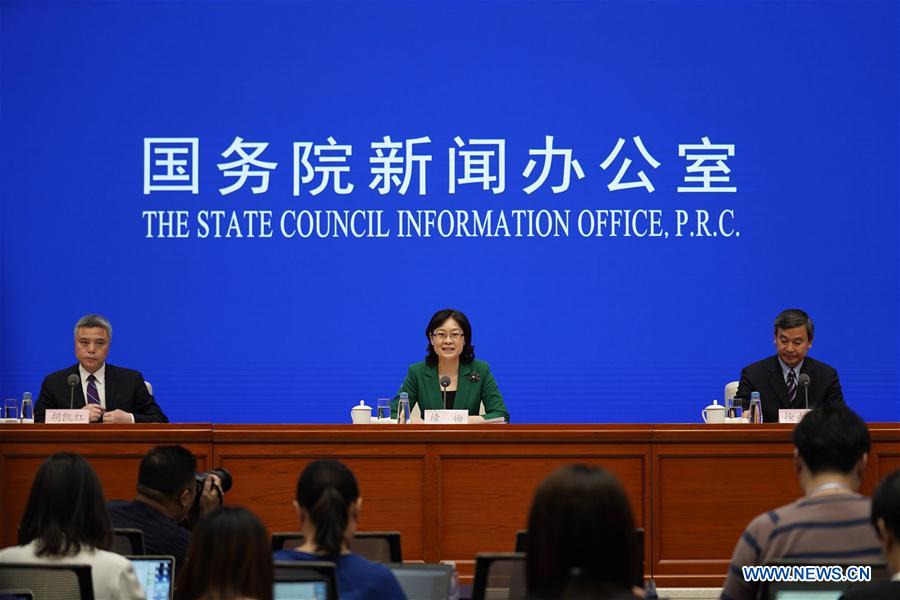?

Xu Mei (C), spokesperson of China's Ministry of Education, attends a press conference in Beijing, capital of China, June 3, 2019. (Xinhua/Jin Liangkuai)
BEIJING, June 21 (Xinhua) -- A student in the elite University of Science and Technology of China (USTC) has planned to pursue further studies in the United States for a long time, however, his hopes and dreams ultimately came to a standstill, not because of his academic performance, but because of where he's from.
The student, who chose to speak using a pseudo name as Wu Fang, got Ph.D. offers from six American schools but picked the University of California, Berkeley. He applied for a visa on May 15 and is still waiting for approval.
Earlier this month, China's Ministry of Education warned students about the U.S. restricting visas for Chinese students, extending visa review time, shortening the validity period and increasing the refusal rate.
Graduate students in the fields of science, technology, engineering and math like Wu have been disproportionately affected by the restrictions since last year, according to Yang Xinyu, minister counselor for educational affairs at the Chinese Embassy in the United States.
The alert has prompted many Chinese students' re-evaluation on studying in the U.S., confusion about the visa requirements and calls from educational institutions on greater openness and diversity in education.
GROWING CONCERNS
Wu said many of his classmates made plans to further their studies overseas a long time ago, but now they are having doubts about their choices.
"Some even worry they cannot get a visa because they received scholarships from Huawei," he said.
Among the 10,300 people supported by Chinese government scholarships in 2018 to study in the U.S., 3.2 percent canceled trips due to visa problems. The rate surged to 13.5 percent in the first three months of 2019, according to the China Scholarship Council.
Ding Zejun, a physics professor with USTC, said some of the visa requirements from the U.S. are confusing.
Ding applied for a visa in March for attending an academic conference but was asked to submit additional information such as details about family members, addresses and social media accounts used in the past 15 years.
"To me, it looks more like gathering personal information," Ding said.
Many U.S. educational institutions are concerned that the restriction may undermine academic exchanges and their competitiveness.
James Holloway, vice provost for global engagement and interdisciplinary academic affairs of the University of Michigan, said their students and faculty of Chinese heritage are concerned the creation of barriers to the free flow of ideas will make their work to generate new knowledge harder.
Alarmed by the visa restrictions, seven American universities including Yale, Stanford, and U.C. Berkeley, have voiced support for educational openness and international exchanges.
Mary Sue Coleman, president of the Association of American Universities which embraces 62 leading U.S. research institutes, said the U.S. has a tradition of welcoming the best and brightest from around the world since the middle of the last century.
"I'm deeply troubled that many around the globe now perceive America as being less welcoming to talented students and researchers," Coleman said.
NEW DESTINATIONS
Wang Han (an alias used to avoid visa problems), a senior at USTC, chose the University of Nottingham in the U.K. for his summer exchange program this year over a U.S. university.
Going to study in the U.S. used to be almost like a tradition, Wang said, as seniors who went there always passed on their experiences about the application process and school information with younger students.
A report by the U.S.-based Institute of International Education showed U.S. colleges and universities registered more than 363,000 Chinese students in the 2017-2018 academic year, making up about a third of the international student body. China has become the largest source of international students for nine consecutive years in the U.S.
Wang said his decision to choose a British university is, to some degree, affected by the current China-U.S. relations.
According to New Oriental Education and Technology Group, China's major English training agency, some of the U.S. university tours it organized have been canceled as customers withdrew from the trips following the visa alert.
A 2019 report by EIC Education, a major overseas educational counseling service provider in China, showed 20.14 percent of the surveyed Chinese students preferred the U.K. for further studies, surpassing the U.S. (17.05 percent) to become the most preferred destination.
Holloway, the vice provost from the University of Michigan, said the U.S. may increasingly lose some of the very best students to universities in other countries, including Canada, the U.K. and Australia.
Wang said he did not consider any U.S. schools for his summer exchange program, though he and many of his classmates recognize their high-quality research levels and academic environment.
"It's disheartening, not because of the schools, but because of government policies," said Wang.



